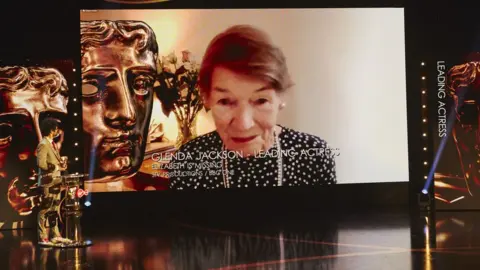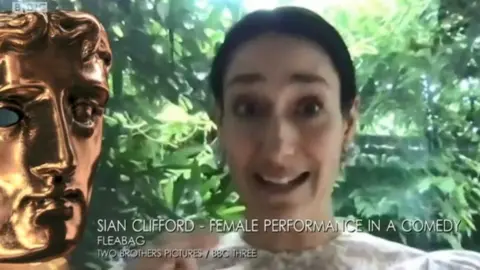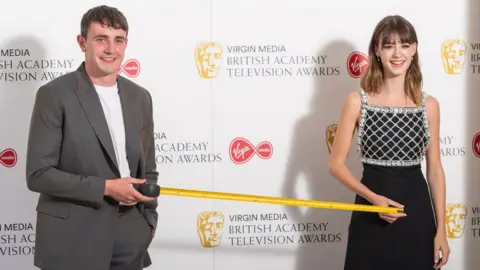Bafta TV Awards: Glenda Jackson 'stunned' to be named best actress
Glenda Jackson has won best actress at the Bafta TV Awards for Elizabeth Is Missing, her first television role in 27 years.
The 84-year-old, who was last nominated for a Bafta in 1974, said she was "absolutely stunned".
Sky Atlantic miniseries Chernobyl, starring Jared Harris, won awards for best miniseries and best leading actor.
The event was held as a closed studio, socially distanced show and awards were accepted virtually.
Host Richard Ayoade made light of the unusual circumstances during a sardonic opening address from BBC Television Centre in west London.
"It's sad it had taken a pandemic to enforce the most basic parameters of personal space," he joked.
The result, he said, would be "the least touchy-feely Baftas to date".
 BAFTA
BAFTAHis intro was followed by a satirical song from Tim Minchin about the pandemic's impact on the film, TV and theatre industries.
"If Matilda stays closed, am I still rich?" he sang, referencing his own stage musical in a video filmed in Australia.
The first award of the night went to Mo Gilligan for best entertainment performance.
He was recognised for his Channel 4 programme The Lateish Show, beating Frankie Boyle and previous winners Graham Norton and Lee Mack.
Fleabag creator Phoebe Waller-Bridge lost out to her co-star Sian Clifford for the female performance in a comedy programme award.
A tearful Clifford called her win "stupid, weird and surreal" while insisting the nominees in her category were "all winners".

Jamie Demetriou, who appeared in Fleabag's first series, picked up the prize for male performance in a comedy programme for his role in Stath Lets Flats.
He used his speech to thank a childhood friend for "getting me to do comedy when I was trying to be the bad boy of musical theatre when I was 21".
Stath Lets Flats went on to win the award for best scripted comedy, beating Fleabag, Catastrophe and Derry Girls.

Double winners
- Chernobyl - Mini-series, Leading actor (Jared Harris)
- The End of the F***Ing World - Drama series, Supporting actress (Naomi Ackie)
- Stath Lets Flats - Scripted comedy, Male performance in a comedy programme (Jamie Demetriou)

The award for supporting actress went to Naomi Ackie for Channel 4 drama The End of the F***ing World, which also won best drama series.
The British actress dedicated her prize to her father and late mother, adding: "This makes lockdown so much better."
The best supporting actor award went to Will Sharpe for his role as a sex worker in BBC Two crime drama Giri/Haji.
Strictly Come Dancing was named best entertainment programme for the second time.
 PA Media
PA MediaIdris Elba said he was "very proud" to be recognised with a special Bafta for both his craft and for championing diversity and new talent.
"What I have done is taken my opportunity and handed it backwards to other people that need that opportunity," the star of Luther and The Wire said.
"One day I might get an acting award but until that day I am going to make more opportunities for more actors, more writers and more people to come and tell their story."
TV viewers voted the cliffhanger proposal scene from Gavin and Stacey's Christmas special as their "must-see moment" of the year.
James Corden, one of the sitcom's stars and co-creators, called the prize "the lovely icing on an already really lovely cake."
"I just want to sink my teeth into that Bafta and suck all the sugary juices from it," joked Ruth Jones, his co-star and co-writer.
Allow Google YouTube content?
ITV's Emmerdale was named best soap and continuing drama, while Taskmaster on Dave won the award for comedy entertainment programme.
Michael Jackson documentary Leaving Neverland received the factual series prize, while Blue Planet Live was crowned best live event.
Speaking ahead of the awards, Glenda Jackson said it had been "a privilege" to play a woman with dementia in Elizabeth Is Missing.
"What it deals with is being suffered by an increasing number of people," she said during a pre-show aired on Bafta's social media channels.
The two-time Oscar winner gave up acting in the 1990s to pursue a career in politics as Labour MP for Hampstead and Highgate.
She returned to acting in 2015, appearing on radio and stage before taking the lead role in the TV version of Emma Healey's novel.
The TV Baftas came two weeks on from the TV Craft Baftas, which saw Chernobyl receive seven prizes for technical achievement.
Bafta - the British Academy of Film and Television Arts - was founded in 1947 and has been presenting TV awards since 1955.
The Bafta TV Awards were shown as-live on BBC One and can be watched on BBC iPlayer.

Follow us on Facebook, on Twitter @BBCNewsEnts, or on Instagram at bbcnewsents. If you have a story suggestion email [email protected],
